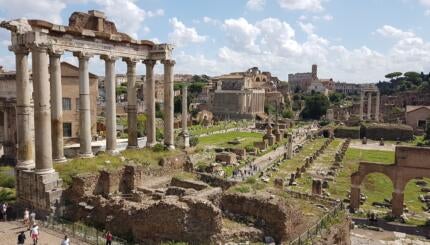What is home? The question sounds like it would best be answered by a children’s book on which each page proclaims a sweet tautology like, “Home is where you feel at home.” There would be a picture of the family nest, parents, grandparents, kids and a dog, a fire in the hearth and soup on the table. Home as Norman Rockwell painted it. Home as so many have sung it: “O say does that star-spangled banner yet wave / Oe’r the land of the free and the home of the brave.”
But pondering what home really is opens us to what is arguably the most troubling political and theological puzzle of our times. For we have entered an age of homelessness and Homeland Security, of mass migrations and refugees fleeing scarcity, tyranny, drought and famine, of rising oceans, poisoned air and water, ongoing wars that destroy homes while killing and displacing whole populations. We have entered the age of the loss of home.
It is especially important for Jews to reflect on the meaning of home today. Not only because that is precisely the philosophical task of this week’s Sukkot holiday, but because we live in the aftermath of a war in which we were almost erased from the earth. And because we live in the presence of a 75-year-old reborn Jewish state, where many Jews feel they have come home to a security unavailable elsewhere.
So what does it mean, for a person or a people or a species, to lose home or to come home? What exactly is lost when you lose home and what is gained when you recover it?
With your help, My Jewish Learning can provide endless opportunities for learning, connection and discovery.
It’s historically true that Jews know much more about exile than home, more about wandering the wilderness than inhabiting the land. On Sukkot, we are instructed to consider that home may not be fixed, stable and enduring but rather fragile, temporary and portable. How dissonant it can sound then to ears inured to exile when they hear Jerusalem, the object of millennial yearning, described as the “eternal undivided capital” of a state, a national possession, a city like any other.
I invite you to consider the reflections of a man born in rural Austria in 1912, the son of an assimilated Jewish father and a Catholic mother who, forced to recognize his Jewish ancestry in 1935 when the Nazis passed the Nuremberg Laws, finally fled to Belgium with his Jewish wife in 1938 after Hitler annexed his homeland. An adamant atheist, he was arrested by the Gestapo in Brussels, tortured and then bounced among various camps for two years until the war’s end. When he returned to Brussels anxious to reunite with his wife, he discovered she had died. Alone, unknown and penniless, he changed his German name to Jean Amery and became a journalist and essayist.
In one of his essays, he writes: “For there is, after all, something like a transportable home, or at least an ersatz for home. That can be religion, like the Jewish one. ‘Next year in Jerusalem,’ the Jews have promised themselves for generations during their Passover ritual, but it wasn’t at all a matter of really getting to the Holy Land; rather it sufficed to pronounce the formula together and to know that one was united in the magic domain of the tribal God Yahweh.” Amery could still think of home, but he could no longer taste it. In losing home, he had lost himself. And in 1978, he finally took his own life.
Now consider the thinking of a man who left his home in Warsaw voluntarily at the age of 17 to study and teach in Vilna and Berlin before eventually finding himself a refugee in the United States in 1940. In his short classic, The Sabbath (1951), Rabbi Abraham Joshua Heschel writes of finding spiritual home not in space, but in time: “The Bible is more concerned with time than with space. It sees the world in the dimension of time. It pays more attention to generations, to events, than to countries, to things; it is more concerned with history than with geography.”
Yet just weeks after the Six-Day War of 1967 and the Israeli army’s lightning conquest of Jerusalem, the West Bank, the Sinai peninsula and the Golan Heights, Heschel visited Israel. Smitten by what he experienced there, he wrote a book, Israel: An Echo of Eternity, which seemed to many readers a repudiation of his earlier thinking. He writes: “There are moments in history which are unique, moments which have tied the heart of our people to Jerusalem forever. These moments and the city of Jerusalem radiate the light of the spirit throughout the world. The light of the spirit is not a thing of space, imprisoned in a particular place. Yet for the spirit of Jerusalem to be everywhere, Jerusalem must first be somewhere.”
Was Heschel overcome by a moment that felt like homecoming? Or shall we say he lived and thought like a pilgrim who understood that while life is always about the quest, there are nevertheless times when a pilgrim needs, sometimes desperately, glimpses of home both in space and in time?
Amery could not abide homelessness. Heschel was able to take up the task of working for and with African Americans in their own struggle for home. When you feel at home you feel commanded to extend that feeling to others. Sukkot teaches that home is the place and the moment to offer shelter to strangers.
This article initially appeared in My Jewish Learning’s Shabbat newsletter Recharge on Sep. 30, 2023. To sign up to receive Recharge each week in your inbox, click here.



